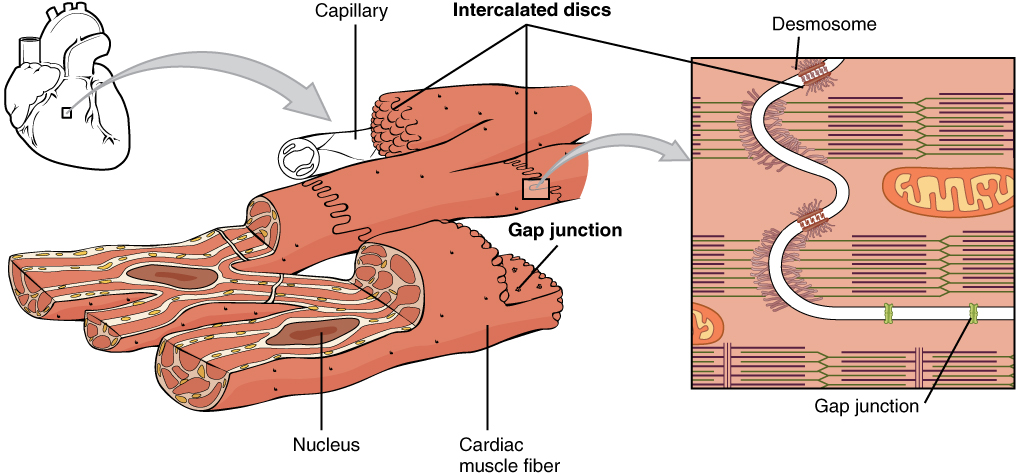A movement is involuntary and cells possess striations. Which of these characteristics best describes cardiac muscle tissue.

Cardiac Muscle Tissue Anatomy And Physiology
E multinucleate and long cylindrical cells.

. They are involuntary and intrinsically controlled striated branched and single nucleated. Multinucleate and long cylindrical cells b. Cardiac muscle is highly organized and contains many types of cell including fibroblasts smooth muscle cells and cardiomyocytes.
Four characteristics define cardiac muscle tissue cells. Multinucleate and long cylindrical. Describes how cardiac sympathetic and parasympathetic nerves alter the heart rate and conduction of cardiac action potentials.
Cardiac muscle fibers are long branched cells shaped like cylinders joined end-to-end with one or two nuclei located centrally. This continuous rhythmic activity is a major physiological difference between cardiac and skeletal muscle tissue. Cardiac muscle is also striated has repeating sarcomeres like skeletal muscle.
Cardiac muscle tissue is only found in the heart. Defines the terms chronotropic and dromotropic. Lists the subcellular structures responsible for cardiac muscle cell contraction.
They are involuntary intrinsically controlled striated branched and single nucleated. Which of these characteristics best describes cardiac muscle tissue. Muscle tissue that activates arrector pili muscles to stand hairs on end.
Movement is involuntary and cells possess striations Which type of epithelial tissue is found lining the kidney tubules. Cardiac muscle is characterized by striped muscle fibers connected together by intercolated disks where the membranes are specialized to allow electrical signals to pass easily. Which of these characteristics best describes cardiac muscle tissue.
Which of these characteristics best describes cardiac muscle tissue. B attached to the skeleton. They are branched and have striations.
A Voluntary movement and cells striations b Attached to the skeleton c Multinucleate and long cylindrical cells. Characteristics of Cardiac Muscle. Which of these characteristics best describe cardiac muscle tissue Movement is involuntary and cells possess striations The type of muscle found in the walls of hollow organs such as the stomach and in the walls of the blood vessels is.
Together they are considered myofibrils. The fibers are separated by collagenous tissue that supports the capillary network of cardiac tissue. The cardiac muscle tissue of your right ventricle is replaced with fatty or fiber-rich tissue.
Muscle tissue conducts nerve impulses from one. They are generally uninucleate. Actin and myosin are contractile protein filaments with actin making up thin filaments and myosin contributing to thick filaments.
The myofilaments of cardiac muscle are arranged in a similar pattern to skeletal muscle resulting in cross-striations. The type of muscle found in the walls of blood vessels is _____. -Cardiac muscle fibers can also use lactic acid.
Similar to skeletal muscle cardiac muscle is striated and organized into sarcomeres possessing the same banding organization as skeletal muscle. Cardiac muscle composed of the contractile cells of the heart has a striated appearance due to alternating thick and thin filaments composed of myosin and actin. It has certain peculiar characteristics like they are cylindrical in shape.
Highly coordinated contractions of cardiac muscle pump blood into the vessels of the circulatory system. Attached to the skeleton e. _____ muscle tissue has no visible striations and has spindle-shaped cells.
In the heart and. Movement is voluntary and cells possess striations c. The ring of muscle tissue that controls the pupils size is called the.
It contains cardiac. Smooth muscle is found in the walls of hollow organs such as stomach and also in blood vessels. The ring of muscle tissue that controls the pupils size is called the.
Like skeletal muscles cardiac muscles also contract quickly. --The mitochondria in cardiac muscle fibers are larger and more numerous-cardiac muscle tissue depends largely on aerobic cellular respiration to generate ATP and thus requires a constant supply of oxygen. Single nucleus and spindle-shaped cells.
Cardiac muscle cells like skeletal muscle cells are made up of sarcomeres that contain actin and myosin filaments which create the dark and light bands called striations. Like smooth muscles cardiac muscles can remain in contraction for a sustained period. D single nucleus and spindle-shaped cells.
The answer is a true. Cardiac muscle only exists in the heart. Cardiac muscle tissue is found.
Single nucleus and spindle-shaped cells d. The characteristics of cardiac muscles include. Damaged tissues that are repaired by the same kind of cells experience a replacement process known as _ regeneration.
This can lead to arrhythmia which refers to an abnormal heart rate or rhythm. However cardiac muscle fibers are shorter than skeletal muscle fibers and. Cardiac muscle is involuntarily controlled like smooth muscle.
The student understands the contractile processes of cardiac muscle cells. Which of these characteristics best describes cardiac muscle tissue. Correct option is A Cardiac muscles are involuntary muscles in the heart.
Muscle tissue that maintains posture body position and stabilizes joints. Which of these characteristics best describes cardiac muscle tissue. Which of these characteristics best describes cardiac muscle tissue.
C movement is voluntary and cells possess striations.

Cardiac Muscle Definition Function Structure Britannica
:background_color(FFFFFF):format(jpeg)/images/library/13939/LNOsY5VQ7ADcaM1g9m5g_Cardiac_Muscle.png)
0 Comments